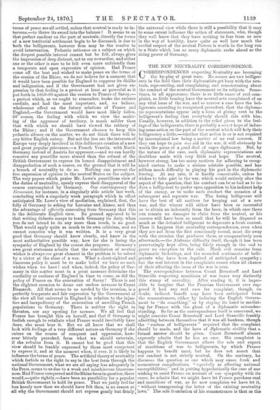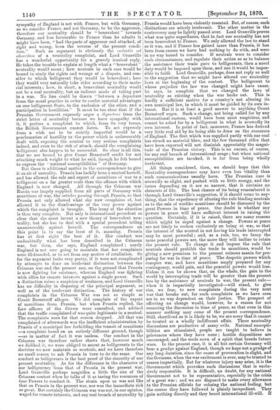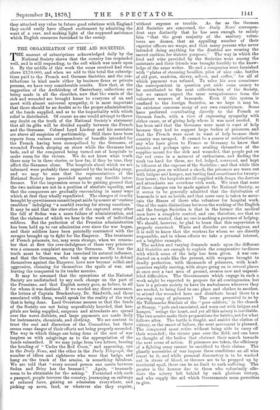THE NEW NEUTRALITY CORRESPONDENCE.
CORRESPONDENCES respecting Neutrality are becoming the by-play of great wars. No sooner are two belliger- ents in the field than their diplomatists get busy with the neu- trals, representing, and complaining, and remonstrating about the conduct of the neutral Government or its subjects. Some- times, to all appearance, there is so little cause of real com- plaint, so little bearing have the neutral acts complained of on any vital issue of the war, and so narrow a case have the bel- ligerents according to recognized precedent, that the diploma- tic representations appear only a form of giving vent to the belligerent's feeling that everybody should side with him. Usually, however, in addition to the relief given to the feel- ings of the belligerents, there is probably a secret hope of induc- ing some action on the part of the neutral which will help their belligerency a little,—whether that action is or is not required by international law being a matter of no real concern. If they can hope to gain any aid in the war, it will obviously be worth the pains of a good deal of eager diplomacy. But, by the nature of the case, such diplomatic representations are doubtless made with very little real hope. The neutral, however strong, has too many motives for adhering to recog- nized custom to make a serious mistake possible, and has seldom much difficulty in playing his part in the diplomatic fencing. At any rate, it is hardly conceivable, unless he wishes to take part in the war, which mould entirely alter the aspect of the question, that his conduct can be so bad as to in- duce a belligerent to prefer open opposition to his indirect help of the enemy, or to make such conduct the occasion of a subsequent and separate war. The losing belligerent will have the best of all motives for keeping out of a new war, and the winner will either have been so successful as to obtain an indemnity from the loser, in which ease there can remain no damages to claim from the neutral, or his success will have been so small that he will be disposed as much as the defeated belligerent to deprecate a fresh contest. Thus it happens that neutrality correspondences, even when they are not from the first consciously unreal, must die away with the occasion that produces them, or comparatively soon afterwards,—the Alabama difficulty itself, though it has been perseveringly kept alive, being likely enough in the end to- prove no exception to the rule. Much evil remains from diplomatic bickerings, and the wounded sentiments of belli- gerents who have been deprived of anticipated sympathy ; but the real interest in the complaints ceases when all chance of their affecting the issue of the war is over.
The correspondence between Count Bernstorff and Lord Granville respecting munitions of war bears very distinctly
this stamp of unreality. After reading it, it is impos- sible to imagine that the Prussian Government ever sup- posed it had any real case for complaint, though, no doubt, indirect benefit may have been anticipated from the remonstrances, either by inducing the English Govern- ment to "do something," or by staying its hand in mediat- ing for France with the ghost of a diplomatic misunder- standing. So far as the correspondence itself is concerned, we might conceive Count Bernstorff and Lord Granville frankly admitting between themselves that it was all bunkum, though the "custom of belligerents " required that the complaint should be made, and the laws of dtplomatic civility that a formal answer should be given. Count Bernstorff almost expressly admits that he has no ease. His complaint is that the English Government allows the sale and export of munitions of war to belligerents, by which France
happens to benefit most, but he does not assert that our conduct is not strictly neutral. On the contrary, he discusses the question as one which may cause fresh and
momentous complications, "especially as affecting national susceptibilities;" and in putting hypothetically the case of our wishing to assist France on account of our sympathy with its cause, he admits that we might have let France purchase coal and munitions of war, as he now complains we have let it, "without transgressing the letter of the existing neutrality laws." The sole foundation of his remonstrance is that as the
sympathy of England is not with France, but with Germany, as we consider France, and not Germany, to be the aggressor, therefore our neutrality should be " benevolent " towards Germany, and less favourable to France than he admits it might have been, "had the parts of aggressor and attacked, of right and wrong, been the reverse of the present condi- tion." Such an argument is obviously the reductio ad absurdum of a neutrality complaint, and Lord Granville has a wonderful opportunity for a gravely ironical reply. He takes the trouble to explain at length what a " benevolent " neutrality would mean ; how neutrals in each case would be bound to study the rights and wrongs of a dispute, and con- sider to which belligerent they would be benevolent ; how they would very naturally take sides according to their mate- rial interests; how, in short., a benevolent neutrality would not be a real neutrality, but an indirect mode of taking part in a war. No line could be drawn "between a departure from the usual practice in order to confer material advantages on one belligerent State, to the exclusion of the other, and a participation in hostilities." It must be too clear that if the Prussian Government expressly urges a departure from the strict letter of neutrality because we have sympathy with it, it prefers a complaint to which, from its very terms, the British Government cannot listen. To act expressly from a wish not to be strictly impartial would be a proclamation of hostility to the power which is unfavourably dealt with, exposing the neutral to very serious complaints indeed, and even to the risk of attack, should the complaining belligerent also happen to be successful. So clear is all this, that we are bound to give Count Bernstorff credit for not attaching much weight to what he said, though he felt bound to express the "national susceptibilities" of Germany.
But there is additional matter in the correspondence to give it an air of unreality. Prussia has luckily been a neutral herself, and has allowed the sale and export of munitions of war to a belligerent on a far greater scale than the offence with which England is now charged. All through the Crimean war Russia was largely supplied from all parts of Germany with munitions of war, the articles passing through Prussia, so that Prussia not only allowed what she now complains of, but allowed it to the disadvantage of the very power against which the complaint is brought. The irony of the situation is thus very complete. Not only is international precedent so clear that she must invent a new theory of benevolent neu- trality, but she has to deal with a special precedent telling unanswerably against herself. The correspondence on this point is, to say the least of it, amusing. Prussia has at first sight the best of it. Her conduct was undoubtedly what has been described in the Crimean war, but then, she says, England complained ; surely England is not now going to maintain that her complaints were ill-founded, or to act from any motive of retaliation. So far the argument looks very pretty, if it were not complicated by attempts to draw an irrelevant distinction between the Crimean war and the present one, on the ground that Prussia is now fighting for existence, whereas England was fighting with allies for remote interests against a single power. Such a distinction raises a suspicion of weakness, and Lord Granville has no difficulty in disposing of the principal argument, as well as of the irrelevant distinction. The history of our complaints in the Crimean War was not so simple as Count Bernstorff alleges. We did complain of the export of munitions from Prussia, but when Prussia replied, the Law officers of the Crown were consulted, and advised that the traffic complained of was quite legitimate in a neutral. The complaints were for that reason dropped. All that was complained of afterwards was the inefficient administration by Prussia of a municipal law forbidding the transit of munitions — a complaint based on an entirely different ground, though — as in matter of fact it was useless. Our conduct in the Crimean war therefore rather shows that, however much we disliked it, we were obliged to assent as belligerents to the doctrine we now maintain as neutrals, and we have therefore no small reason to ask Prussia in turn to do the same. Our conduct as belligerents is the best proof of the sincerity of our present neutrality. As for the difference in the character of our belligerency from that of Prussia in the present war, Lord Granville perhaps magnifies a little the size of the Crimean contest when he talks of it as taxing the resources of four Powers to conduct it. The strain upon us was not like that on Prussia in the present war, nor was the immediate risk so great. But certainly the Crimean war was not, in our opinion, waged for remote interests, and any real breach of neutrality by I Prussia would have been violently resented. But, of course, such distinctions are utterly irrelevant. The other matter in the controversy may be lightly passed over. Lord Granville proves what was quite superfluous, that in fact our neutrality has not been benevolent to France. We only allowed the law to stand as it was, and if France has gained more than Prussia, it has been from causes we have had nothing to do with, and were in no way bound to consider. If neutrals were to consider such circumstances, and regulate their action so as to balance the assistance their trade gave to belligerents, then a novel duty would be imposed upon them, and one it would be impos- sible to fulfil. Lord Granville, perhaps, does not reply so well to the suggestion that we might have altered our neutrality laws at the beginning of the contest. The belligerent to whose prejudice the law was changed might have cause, he says, to complain that we changed the laws of neutrality as existing when the war broke out. This is hardly a sufficient motive for a country's not altering its own municipal law, in which it must be guided by its own in- terest. But it is at least a good answer to anything Count Bernstorff urges. Such a change, not being called for by any international custom, would have been most suspicious, and cannot be asked for by a belligerent in what is avowedly its own interest. In point of fact, moreover, France has derived very little real aid by its being able to draw on the resources of England. The fleet which was supplied partly with our coal • has struck no material blow, and the few thousand rifles that have been exported will not diminish appreciably the magni- tude of the Prussian victory. This is no excuse, of course, for any real breach of international usage ; but when national susceptibilities are invoked, it is far from being wholly irrelevant.
All things considered, then, we should hope that this Neutrality correspondence may have even less vitality than such communications usually have. The Prussian case is avowedly so slight, and pushed with so little energy, and the issues depending on it are so narrow, that it contains no elements of life. The best chance of its being remembered is through Lord Granville's suggestion, if it should come to any- thing, that the expediency of altering the rule binding neutrals as to the sale of warlike munitions should be discussed by the great Powers in time of peace. Our doubt is whether any powers in peace will have sufficient interest in raising the question. Certainly, if it is raised, there are many reasons which might be urged against a change. Powers at peace are not likely to reckon exclusively on being at war, so that the interest of the neutral in not having his trade interrupted may be most powerful ; and, as a rule, too, we fancy the more peaceful powers are, the more they will incline to retain the present rule. To change it and impose the rule that neutrals should prohibit the trade in munitions, would be giving a new premium to the present ruinous mania for pre- paring for war in time of peace. The despotic powers which conspire war, and have munitions amply prepared for any contingency, would gain, and the peaceful powers would lose. Unless it can be shown that, on the whole, the gain to the world by interrupting trade will be greater than the present loss by the assistance of neutrals to war, the present rule— when it is impartially investigated—will stand, to give rise, we fear, to new complaints during the very next war that breaks out, for such complaints as we have seen are in no way dependent on their justice. The prospect of effecting no change would, however, be a reason for not resuming the discussion in time of peace, so that even in this manner nothing may come of the present correspondence. Still, shortlived as it is likely to be, we are sorry that it cannot be treated as a wholly indifferent affair. These neutrality discussions are productive of many evils. National suscepti- bilities are stimulated, people are taught to believe in grievances where they have none ; hostile dispositions are encouraged, and the seeds sown of a spirit that breeds future wars. In the present case, it is all but certain Germany will bear a grudge against England, though we hope not a grudge of any long duration, since the cause of provocation is slight, and the Germans, when the war excitement is over, maybe trusted to reason impartially. But for whatever injury may arise, it is the Government which provokes such discussions that is exclu- sively responsible. It is difficult, no doubt, for any national Government not to be representative, especially in the crisis of a great war ; and we are disposed to make every allowance to the Prussian officials for echoing the national feeling, but the course they have followed is plainly inexpedient. They gain nothing directly and they breed international ill-will. If they attached any value to future good relations with England they could easily have allayed excitement by admitting the want of a case, and making light of the supposed assistance which English resources furnished to the enemy.
































 Previous page
Previous page